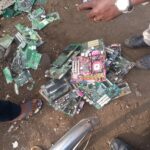A few days after returning from the 2013 version of the African Mining Indaba, I thought it would be good to share some observations and comments.
As usual, it was a great time to be in the Cape, particularly bearing in mind the weather and the beautiful surroundings. And it was very good to catch up with various persons who I have worked with over the years, all now spread over different companies and institutions.
The Indaba was well-attended this year, maybe even too well-attended. With 7,000 participants milling around and the limited time available, you still miss out on meeting some people, even though you know they are there.
There was no ‘Doom and Gloom’ atmosphere in the exploration booths, even though a large number of companies have run their bank accounts down to very low levels, so that they cannot really carry out expensive exploration programmes. It all seems to be about doing little bits of work (maybe some selected drilling) and to reinterpret data and talk up your project with lots of modelling and colourful maps, not to mention name-dropping of successful neighbour mines and projects.
I think that bargains are developing there, since the African continent is still very under-explored and under-developed with mining sites. But the exploration game is a competitive one, and there is certainly also competition between countries for the exploration money. Some countries may not think so, they may expect that their popularity with exploration companies will just continue unchanged. It is clear, however, that companies are being attracted by other countries with more attractive legislation, arguably better governance and more prospectivity.
I attended a number of the Sustainable Development sessions, which were very interesting. We are all used to various captains of industry talking up their industry’s CSR programmes, but this year we had real discussions between industry, donor agencies, NGO’s and academia. The format of keynote speeches followed by panel discussions was well-managed and worked well. There is a clear understanding that sustainability can only come from real cooperation and partnership between all stakeholders: Industry, government, NGO’s and communities. I obviously cannot do justice to all the discussions there, with a few comments here. But some opinions and observations were memorable enough (for me) to share with you:
Dr. Joyce Aryee (previously CEO of the Ghana Chamber of Mines) noted that the mining industry is contributing to society and to local communities, but that it could do more. Newmont’s Schwimmer described the large extent to which that company contributes directly to the Ghanaian economy, not only in royalties and taxes, but also in local procurement and employment. Dr. Mamphela Ramphele (until recently with Goldfields) noted that the mining sector in South Africa will have to accept that the days of cheap, abundant labour are over, and that it would have to adapt accordingly. Prof May Hermanus of the Centre for Sustainability in Mining and Industry, at Wits University, found it difficult to expect full development outcomes, even if mining companies act responsibly, if there is poor governance in host countries. I have to agree. Sierra Leone’s Deputy Minister of Mines expressed the same view: It is through good governance that mining will contribute maximally to the country’s GDP. Mark Cutifani, new CEO of Anglo American, described how the extractive industry should become a development industry. In his view this industry is the most important one to create the world and the society we want to live in. He was one of the voices who called for cooperation between stakeholders, even those with opposing views and positions. I have found this to be a challenge – it is just too easy for those who are critical of the mining industry to speak (if not shout) loudly about all the problems. This earns them visibility and probably funding. But when you want to engage with certain NGO’s, to find ways of addressing problems, they disappear like mist before the morning sun.
This industry is a controversial one, probably will always be. However, if we want to live in a world that develops, which provides better opportunities and quality of life for our children, then we cannot do without mining. It was therefore good to hear the discussions at this Indaba about the improvement of the process, rather than just more pro- and anti- rhetoric.

